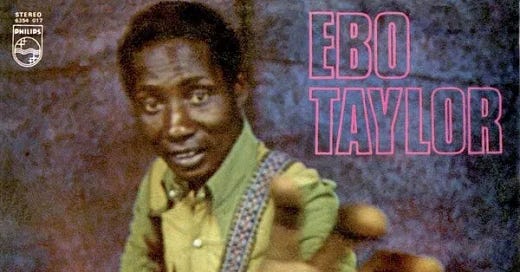EVERY GENRE PROJECT - March 10 - Highlife
Genre of the Day - Highlife
Album of the Day - Twer Nyame by Ebo Taylor (1978)
March 10, 2024
Earlier this week, I wrote one of my first papers this semester—I’ve seriously lucked out with this semester’s classes’ demands—and talked at length about how amapiano may experience what is called soft shell dynamics in popular music thanks to its popularity worldwide surging from Tyla’s smash hit “Water.” The notion of soft shell dynamics in the music context refers to the ways a genre gets watered down and polished of its rough edges in the process of popularization and commercialization. Amapiano comes in a long lineage of popularized, impactful African dance music genres, though, and highlife is perhaps the most important of all.
Highlife traces its history all the way back to the late 19th century in Britain’s holdings in West Africa, and in particular Ghana. Imported European styles were beginning to fuse with local music traditions, and this accelerated in bars in the 1920s where bands would combine osibisaba and other traditional rhythms with European instrumentation (horns and guitars). Given that these clubs were typically reserved for local and regional elites, the music being played was dubbed highlife. It shouldn't be surprising to me that like yesterday the genre was essentially crafted in social gathering places like bars or specific clubs, but it makes sense in the context that I’m from a generation that’s accustomed to most musical innovation being driven forward in the bedroom, but it’s so fascinating to ponder how listening to these new styles made people feel and invigorated them at the time of their genesis as highlife continues to do today as it’s grown and evolved.
Anyway, the driving force of accessibility drove highlife to splinter out of its original club origins to guitar bands that were more easily transportable and thus took a hold in rural regions. Plucked string instruments like the gorgeous seperewa have a long history in the region, so incorporating the guitar came naturally. Highlife has continued to evolve and mutate, subsuming and folding in elements of new genres since in addition to springing forth parallel genres like afrobeat. The endless possibilities generated by the combination of the versatile guitar and horn configurations with local rhythms made highlife a self-driven generator of a genre, remaining popular in the region to this day. Ebo Taylor grew up in the golden age of highlife, providing him a musical upbringing he took with him when he went to study in London in the 1960s. Rubbing shoulders with the likes of the Beatles and Fela Kuti, he sharpened a similarly excellent sense of musicality that would allow him to become a highlife and Afro-funk icon in the 1970s.
Today’s album consists of just three indulgent tracks spanning half an hour, with opus title track “Twer Nyame” taking up eighteen minutes alone. Over a rich, vigorous horn section and longing steel guitar, underlaid by a simple one-note organ, Taylor gets in a word here and there with an equally cheerful, almost conversationally light singing voice, but the focus is all on the instruments. Peace on Earth’s intro harkens more to American funk before unfurling into a lusher, more lounge feel accentuated by soft and bright chimes. With “Atwer Abropa” he demonstrates his capacity for balancing innovation with tradition and probes the outer limits of highlife’s possibilities with new electronic sounds, bringing in a robotic, Atari-sounding keyboard solo midway through. It’s dynamic, fresh, rooted in a deep history of fusion, modernity, and tradition that evolved for and with the country and region with decolonization. Taylor summarizes this subtle balance best: “I do believe that it is important for music to progress, otherwise it just becomes something for museums, but you have to know your traditional culture before you start adding things to it.” He has a point: given this music’s creativity, it could surely stand on its own as an object of musical history, but his innovation shows that the need to move forth to make a banger never dies.




